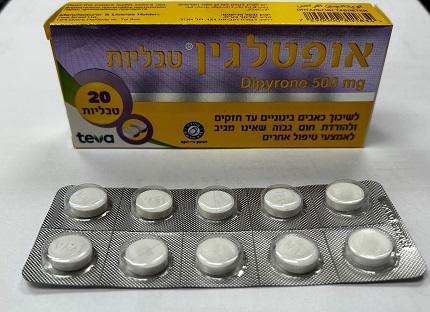Quest for the right Drug

אופטלגין טבליות OPTALGIN TABLETS (DIPYRONE)
תרופה במרשם
תרופה בסל
נרקוטיקה
ציטוטוקסיקה
צורת מתן:
פומי : PER OS
צורת מינון:
טבליה : TABLETS
עלון לרופא
מינוניםPosology התוויות
Indications תופעות לוואי
Adverse reactions התוויות נגד
Contraindications אינטראקציות
Interactions מינון יתר
Overdose הריון/הנקה
Pregnancy & Lactation אוכלוסיות מיוחדות
Special populations תכונות פרמקולוגיות
Pharmacological properties מידע רוקחי
Pharmaceutical particulars אזהרת שימוש
Special Warning עלון לרופא
Physicians Leaflet
Pharmacological properties : תכונות פרמקולוגיות
Pharmacodynamic Properties
5.1 Pharmacodynamic properties Pharmacotherapeutic group: Analgesics; Other analgesics and antipyretics; Pyrazolones ATC code: N02BB02 Dipyrone is a pyrazolone derivative and has analgesic, antipyretic and spasmolytic properties. The mechanism of action is not fully understood. Some research findings suggest that Dipyrone and the main metabolite (4-N-methylaminoantipyrine) may have both a central and a peripheral mechanism of action.
Pharmacokinetic Properties
5.2 Pharmacokinetic properties After oral administration, Dipyrone is completely hydrolyzed to the pharmacologically active 4-N- methylaminoantipyrine (MAA). The bioavailability of MAA is approx. 90% and is slightly higher after oral administration than after parenteral administration. Concomitant intake of food does not have a relevant effect on Dipyrone kinetics. The main metabolite of dipyrone, MAA, is further metabolized in the liver through oxidation and demethylation, followed by acetylation. The clinical efficacy is mainly due to MAA, but also to a certain extent to the metabolite 4- aminoantipyrine (AA). The AUC values for AA represent approx. 25% of the AUC values for MAA. The metabolites 4-N-acetylaminoantipyrine (AAA) and 4-N-formylaminoantipyrine (FAA) appear to be pharmacologically inactive. It should be noted that all of the metabolites display non-linear pharmacokinetics. The clinical significance of this phenomenon is unknown. Accumulation of the metabolites is of little significance with short-term treatment. Dipyrone crosses the placental barrier. The metabolites of Dipyrone are excreted in breast milk. Plasma protein binding is 58% for MAA, 48% for AA, 18% for FAA and 14% for AAA. Dipyrone's plasma half-life following intravenous administration is approx. 14 minutes. After intravenous administration approx. 96% of a radiolabeled dose is recovered in the urine and approx. 6% in the feces. Following a single oral dose, 85% of the urinary metabolites excreted were identified. Of this percentage, MAA accounted for 3±1%, AA 6±3%, AAA 26±8% and FAA 23±4%. Renal clearance after a single oral dose of 1 g Dipyrone was 5±2 mL/min for MAA, 38±13 mL/min for AA, 61±8 mL/min for AAA and 49±5 mL/min for FAA. The associated plasma half-lives were 2.7±0.5 hours for MAA, 3.7±1.3 hours for AA, 9.5±1.5 hours for AAA and 11.2±1.5 hours for FAA. Elderly patients and patients with hepatic dysfunction The AUC is 2 to 3 times higher with treatment of elderly patients. Following a single oral administration, the half-life of MAA and FAA increased approx. 3-fold in patients with hepatic cirrhosis, whereas the half-lives of AA and AAA did not increase to the same extent. High doses should be avoided in such patients. Children and adolescents Optalgin Caplets/Tablets SPC, SZ, 6/2022 NOTIFICATION Children display more rapid elimination of the metabolites than adults do. Renal impairment The data available for patients with renal impairment indicate a reduced elimination rate for some metabolites (AAA and FAA). High doses should therefore be avoided in such patients.

שימוש לפי פנקס קופ''ח כללית 1994
Moderate to severe pain, antipyretic
תאריך הכללה מקורי בסל
01/01/1995
הגבלות
תרופה שאושרה לשימוש כללי בקופ'ח
מידע נוסף
